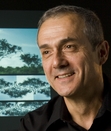Adrian Bejan's Blog, page 8
December 8, 2024
Through the Wormhole with Morgan Freeman - Did God Create Evolution Constructal Theory
The video explores the concept of universal patterns and the possible origins of life and complexity. Adrian Bejan, an engineer and former basketball player, connects his observations of basketball's natural flow to the universe's design. He identifies a recurring tree‐shaped design in various natural and man-made systems, such as trees, lightning, and human physiology.
Bejan attributes this universal structure to the "Constructal Law," which states that systems evolve over time. He argues that this tree‐shaped design enhances efficiency and persistence in nature, from water in trees to blood in veins. While the pattern might suggest a grand designer to some, Bejan believes it's a natural phenomenon reflecting nature's fundamental laws. Bejan uses basketball as a metaphor for societal movements, illustrating how the universe's design evolves for improved flow and complexity.
(Video credit: Did God Create Evolution? - Season 4 - Episode 10)
December 5, 2024
Adrian Bejan I Heatlines, from Convection
In this video, Adrian Bejan discusses the historical and mathematical development of the concept of streamlines and introduces a related concept "Heatlines", focusing on how these ideas are fundamental to understanding fluid flow and heat transfer. By examining mathematical equations, such as the conservation of mass and energy equations, Bejan explains how streamline and heat functions can visually represent and simplify complex physical systems.
December 1, 2024
Adrian Bejan I Prandtl number effect, from Convection
In this video, Adrian Bejan examines the role of the Prandtl number in convective heat transfer, focusing on the interaction between thermal and velocity boundary layers. He explains how dimensionless numbers such as the Prandtl and Nusselt numbers help describe heat flow and fluid behavior. Bejan also discusses historical contributions to heat transfer theory and the practical importance of thermal conductivity and heat transfer coefficients.
November 29, 2024
Adrian Bejan I Thermal Boundary Layer, from Convection
Adrian Bejan discusses the thermal boundary layer in fluid dynamics, focusing on the relationship between heat transfer rates and temperature differences. He explains how the temperature profile in fluid changes as it moves along a surface and introduces concepts such as the thermal boundary layer thickness.
November 26, 2024
Adrian Bejan I Boundary Layer from Constructal Law, from Convection
Adrian Bejan discusses the momentum transfer concept in fluid dynamics, focusing on boundary layer theory and its implications according to the Constructal Law. He explains how momentum is transmitted from moving bodies to stationary fluids and explores the relationship between dimensions and optimal shapes for efficient momentum transmission. Bejan emphasizes the importance of understanding the fluid dynamics of real-world applications and encourages questioning traditional theories to innovate in the field.
November 24, 2024
Adrian Bejan I Viscous Propagation, from Convection
In this video, Adrian Bejan discusses boundary layer theory and viscous propagation in fluid dynamics, elaborating on momentum and mass conservation principles, and the significance of the Reynolds number. He emphasizes the relationship between fluid layers, viscosity, and the effects of friction at boundaries.
November 15, 2024
Adrian Bejan I Boundary Layer Theory, from Convection
Adrian Bejan discusses the foundations of Boundary Layer Theory, focusing on two-dimensional steady-state external flow concepts, the importance of temperature differences in heat transfer, and the historical development of fluid dynamics equations, notably the Navier-Stokes equations. He emphasizes the significance of scale analysis in simplifying these equations and deriving essential characteristics such as skin friction and the behavior of the boundary layer in fluid mechanics.
November 12, 2024
Penning the Physical Law of Evolution Everywhere in Nature
Adrian Bejan’s prolific academic career at Duke University has spanned four decades. Much like the laws of thermodynamics and natural evolution that he has established and taught over the years, his work has flowed freely from one big idea into another.
In hindsight, the course of his work and studies might seem obvious, and perhaps even predictable using the set of theories and laws he has developed along the way.
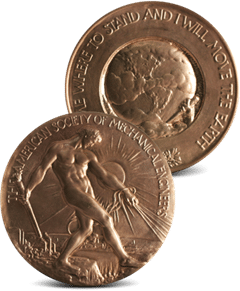
The American Society of Mechanical Engineers Medal
This fall, Bejan’s path and the contributions he has made to science along his way earned him the 2024 American Society of Mechanical Engineers Medal. The highest award that the society can bestow recognizes “eminently distinguished engineering achievement.” In Bejan’s case, the award was given specifically “for unprecedented creativity, breadth, and permanent impact on engineering; for developments in the new science of energy, motion, form, and evolution; and for building bridges to design in biological, geophysical, and sociological systems.”
To better understand what exactly that enormous range of activity encompasses, it’s useful to take a closer look at how Bejan’s work has morphed over the years.
Thermodynamics in Flowing SystemsBejan earned all his degrees from undergraduate to doctorate at the Massachusetts Institute of Technology, where he concentrated on thermodynamics, the science of power and the design—or flow configuration—of moving things pushed by power. His graduate theses were on developing an improved thermal design of a cryogenic cooling system for rotating superconducting windings. After MIT, he became a postdoctoral Miller Fellow at the University of California, Berkeley.
Through these experiences, Bejan wrote his first two books on heat transfer through fluid flows: “Entropy Generation through Heat and Fluid Flow” published in 1982 and “Convection Heat Transfer” published in 1984. Despite his early successes in these thermal systems, Bejan felt from the start that he did not want his career to be constrained to these topics, pushing him to join Duke’s faculty in 1984.
“I knew I had two choices, to choose to stay in the same narrowly defined field, or to be happy,” Bejan said.
He attributes his success and happiness to a few rules of life and creativity, learned while being raised as a basketball player.
The Constructal Law“Freedom is king,” Bejan espouses. “You are a somebody, a one of a kind. Question everything, freely and unafraid. Anything goes. Proceed against established method. Do not trust those who claim that ‘most scientists agree on’ anything. Science is not about counting votes. Science is not democracy. The idea comes from one individual, not from collectivization. The idea is good if it spreads naturally, not sponsored.”
For the early part of Bejan’s career at Duke, he continued contributing fundamental insights to the disciplines of thermodynamics, fluid flow and heat transfer. In 1988, he published the first edition of his textbook “Advanced Engineering Thermodynamics,” which combined thermodynamics theory with heat transfer and fluid mechanics and introduced the method entropy generation minimization as a method of selection.
“Note that Darwin is not needed to achieve those conclusions,” added Bejan.
Soon after, his peers named two dimensionless groups the “Bejan number” in two different fields: for the dimensionless pressure difference group, in heat transfer by forced convection, and for the dimensionless ratio of fluid friction irreversibility divided by heat transfer irreversibility, in thermodynamics. From 1992 to 1996 he also published four more books in these fields.

Adrian Bejan
But as he continued working closely with configurations of heat and fluid flows in various systems—both designed by humans and occurring naturally—he made a new connection that took his career into uncharted territory. He had a vision of what was missing in science: the configuration, the drawing, constantly in motion, driven by power from natural engines, and constantly changing. Missing in physics was the engine as well.
He coined the constructal law in 1995, which states that, for a finite-size flow system to persist in time—or, in his words, to live—it must evolve with freedom in such a way that it offers greater access to its flows. The ‘flows’ might be water in a river, blood vessels in a growing tumor, life over landmasses (city life) or even the periodic cycle of economic downturns.
“The words finite-size was a jolt the other way, against the method of reductionism that dominates physics today,” Bejan said. He coined the words “to persist in time” as the definition of life of any system, biological or not, animate or inanimate, as a necessary add-on to the thermodynamics doctrine where the concept of dead state, where nothing moves or morphs, has been accepted since the late 1800s.
Design in Nature“The laws of thermodynamics do not have a direction in time or for ‘entropy’—such words are jargon, and are not needed,” Bejan said. “The constructal law adds to thermodynamics a common-sense law that covers the occurrence and directionality of all design evolution in nature. Whether it’s an animate or inanimate system, everything has the same tendency to evolve, the same direction in time. With the constructal law, one is empowered to predict the evolution—the future and the past—of any flow system that has freedom to change.”
With these insights in mind, Bejan has spent the latest portion of his career exploring how design processes play out both in nature and in human-centric industries. The topics are almost endless, as is his imagination and ability to connect dots that others do not see.
This “Design in Nature” concept has filled six books written over the past quarter of a century: “Shape and Structure, From Engineering to Nature” in 2000; “Design with Constructal Theory” in 2008; “Design in Nature” in 2012; “The Physics of Life: The Evolution of Everything” in 2016; “Freedom and Evolution: Hierarchy in Nature, Society and Science” in 2020; and “Time and Beauty: Why Time Flies and Beauty Never Dies” in 2022.

Adrian Bejan’s work connects the natural selection of the evolution of both animate and inanimate systems together into a single law rooted in physics
As Bejan describes it, his success has stemmed from his ability to identify a single phenomenon, describe it with a single law, and then invoke that law to create many theories about the world and the many systems within it. Whether it’s the evolution of the size and speed of animals, athletes, winds, rivers, and airplanes, or the Earth’s water cycle, they all adhere to the same fundamental principle that dictates how power from ‘engines’ moves everything that has freedom to move and change, to evolve and persist over time.
Most recently, Bejan says he has been working to upend various known truths that most everyone agrees with. For example, recently he demonstrated how features of flow that seem like obstacles are actually facilitators. He has made the case that ‘intangibles’ such as the human perception of both time and beauty are fundamentally rooted in physics. He showed that perfection is the enemy of evolution rather than its preferred end goal. He also showed that the so-called ‘arrow of time’ has nothing to do with the second law of thermodynamics; instead, the arrow of time is the direction spelled as ‘evolution,’ or constructal law.
Today, Bejan continues using these methods to make unexpected observations about the world around us. And he’s not alone.
This past summer saw the 14th International Constructal Law Conference, which this time was held in Bucharest, feature dozens of speakers presented ideas stemming from Bejan’s central tenet of the role that freedom plays in evolution and nature. But of all the elder statesmen and established professors at the event, the organizers thought the best ideas were presented by Bejan’s four undergraduate students from Duke.
“None of my success would be possible without Duke, which is an oasis of freedom compared to other institutions,” Bejan said. “I describe myself as a free man, not just in freedom here at Duke, but in my world of ideas. And I’m delighted to have with me so many brilliant students.”
✒️ Source: Penning the Physical Law of Evolution Everywhere in Nature
November 11, 2024
The hidden rhythm of nature
Extensive evidence shows that flow systems, when free to change, evolve into structures that enhance movement and flow. This phenomenon can be observed across various domains and scales, including animal locomotion (from insects to large aircraft), river basins and deltas, human movement, lung structure and rhythm, urban development, air traffic, economies, and technological advancements, and many more evolutionary designs. The progression of these designs over time aligns with the natural direction of evolution, a concept referred to as the constructal law.
Apparent obstaclesIn nature, things are not what they seem. The technique (the rhythm) is deceptive. Adrian Bejan
The universality of the evolution of flow configurations towards greater access has not been questioned until recently. An initial test examined three common phenomena that obstruct flow: cataracts (Figure 1), hydraulic jumps (Figure 2), and roll waves of rainwater on the pavement (Figure 3). Despite their seemingly obstructive nature, these designs enhance flow access. This is because vertical free-fall, seen over dams, allows for faster movement than flow hindered by surface friction. Similar to cataracts, roll waves exhibit the same phenomenon, though the pavement beneath roll waves is not erodible.
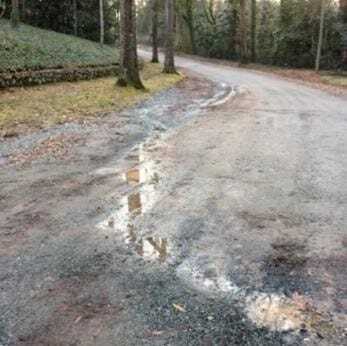 Figure 1. Cataracts Credit. Author
Figure 1. Cataracts Credit. AuthorThis unexpected finding is consistent with earlier examples of flow designs that promote access rather than obstruct access. Instances include turbulence against a surface, respiration, and other rhythmic physiological processes, as well as technologies inspired by mechanisms such as periodic ice formation, surface cleaning, and scheduled power plant maintenance for repair and renewal.
 Figure 2. Hydraulic jump Credit. Author
Figure 2. Hydraulic jump Credit. AuthorA new study examined another common phenomenon that hinders movement: the alternating sticking and sliding at the interface between two bodies in relative motion. The investigation, based on theoretical prediction rather than experimental observation, aimed to determine whether the stick-slip phenomenon obstructs or actually enhances relative motion.
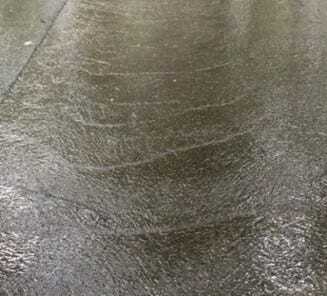 Figure 3. Roll waves Credit. AuthorSticking and sliding
Figure 3. Roll waves Credit. AuthorSticking and slidingThe sticking and sliding phenomenon occurs across various scales, from a metal piece machined on a lathe to active seismic zones where earthquakes are triggered by the sudden shift from sticking to sliding. This phenomenon is often accompanied by distinct screeching sounds, such as those from car tires or train wheels during abrupt stops, basketball shoes on a court, squeaky-clean skin, or the bow on string instruments such as violins.
Upon closer examination, the rhythmic stick-slip phenomenon was relevant to various seemingly unrelated examples, including animal locomotion, mechanical devices like catapults and trebuchets, and athletic activities involving throwing motions, such as baseball, hockey, and boxing.
 Figure 4. Spring-mass model of a body with energy store & release motion. Credit. Author
Figure 4. Spring-mass model of a body with energy store & release motion. Credit. AuthorThe demonstration utilised a basic model of energy storage and release: a weight pulled by a spring sliding on a horizontal surface (figure.4). In this scenario, the coefficient of friction between the weight and the surface is typically higher during sticking than sliding. It was shown that the power required to move the weight is lower when the motion is periodic, involving alternating sticking and sliding, compared to steady, uniform sliding.
Animal locomotionAnimals of all sizes, whether in water, land, or air, display periodic movement (Figure 5, upper right) patterns that follow predictable trends. For instance, the average horizontal speed is proportional to the animal’s body mass (M) raised to the power of 1/6. This relationship also indicates that horizontal speed is proportional to body length raised to the power of 1/2. Additionally, the height of a jump and the distance covered during one movement cycle involving lift and forward motion is directly proportional to the animal’s body length.
 Figure 4. Spring-mass model of a body with energy store & release motion. Credit. Author
Figure 4. Spring-mass model of a body with energy store & release motion. Credit. AuthorThe agreement with theory is accompanied by the diversity compacted in the data clouds. The diversity is also predictable if one accounts for additional features (degrees of freedom) in the assumed model of the moving body. Additional features include the body’s slenderness and the animal’s lifestyle (predator vs. prey).
Instances that deviate significantly from predicted patterns are commonly called “outliers” in scientific literature, awaiting integration into the broader understanding of animal design evolution. Notable examples of such outliers include animals that utilise stored elastic energy released through latch-like mechanisms. Fleas and grasshoppers are prime examples, as they can jump to heights and distances far exceeding their body length by orders of magnitude.
The predictability of the energy store-release design is suggested by the observation that aquatic animals propel themselves over much shorter distances than airborne insects. The jump is expected to be roughly equivalent to the animal’s body length in water. However, in the air, the jump height can exceed the body length by a factor of 100 to 1000, consistent with the remarkable jumping abilities observed in certain insects.
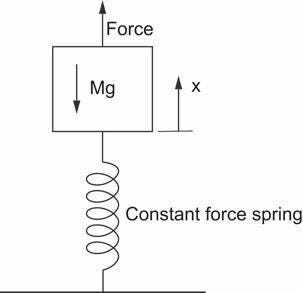 Figure 6. Model of jumping: lifting a weight, viewed as stretching a constant-force spring. Credit. Author
Figure 6. Model of jumping: lifting a weight, viewed as stretching a constant-force spring. Credit. AuthorThe medium (water, air) in which the store-release design (Figure. 6) propels the body is an important participant. This feature contributes to the diversity in the cloud of deviations from the constructal theory of locomotion (Figure. 5).
EarthquakesAnother example of energy storage and release is the motion between two rock layers under pressure at their interface. This periodic motion has traditionally been studied using various models, often resulting in complex movements described as randomness and noise. A new perspective offers a predictive approach, drawing parallels to the stick-slip phenomenon and animal jumping behaviour.
In the earthquake model (Figure 7), the upper rock layer is pushed left while remaining stuck to the lower layer. Shear at the interface causes cracks in the lower layer, with the shear force proportional to the static friction coefficient. These cracks are modelled as perpendicular to the interface, and vertical rock layers emerge between them. These layers bend at their tips in the direction of the shear force exerted by the upper layer.
 Figure 7. Earthquake model: energy store & release motion when two bodies of rock are pressed against each other, and one body develops vertical cracks because of shear at the horizontal interface. Credit. Author
Figure 7. Earthquake model: energy store & release motion when two bodies of rock are pressed against each other, and one body develops vertical cracks because of shear at the horizontal interface. Credit. AuthorA simple comb demonstration can help illustrate the physics behind the model. By pressing a palm against the teeth of the comb and pulling it across, each tooth bends independently. Applying more force eventually causes the palm to slide over the tips of the teeth. For those who find the sensation unpleasant, a piece of rubber, like an eraser, can be used in place of the palm to replicate the effect without the tickling feeling
To concludeThe conclusion drawn from recent research is that energy storage and release movements warrant further examination. A tendency towards greater accessibility plays a crucial role in the evolution of rhythmic configurations, which may appear to hinder movement. The study demonstrated that these energy store-and-release rhythms are both natural and predictable, ultimately facilitating movement.
Nature is filled with designs that function effectively. Successful features are retained, and rhythm is one such characteristic. This principle can be observed in team sports like soccer: less skilled players exhibit more complicated movements, while more proficient players move simply. The most skilled players focus on getting rid of the ball, as running is more efficient and faster than dribbling. In this way, nature evolves like the adept ballplayer, favouring simplicity and effectiveness.
Journal reference
Bejan, A. (2024). Energy store & release facilitating movement in stick & slip friction, animal jump, and earthquake. Scientific Reports, 14(1), 18832. https://doi.org/10.1038/s41598-024-68525-1
✒️ Source: The hidden rhythm of nature: How evolution shapes efficient movement across systems
October 25, 2024
Adrian Bejan I Discipline, from Convection
This lecture by Adrian Bejan explores the discipline of convection, mainly focusing on its principles and significance in predicting heat transfer through fluid motion. He emphasizes the importance of understanding the fundamental laws of convection for practical applications in various fields, comparing it to military discipline and discussing natural and forced convection. The lecture outlines the structure of the course, which includes laminar and turbulent flows and the complexities of multi-phase interactions in convection.

